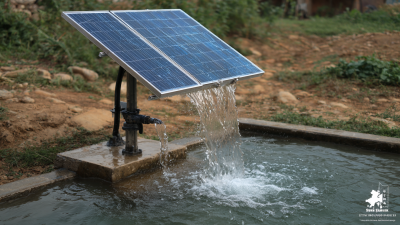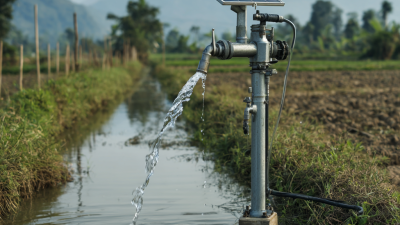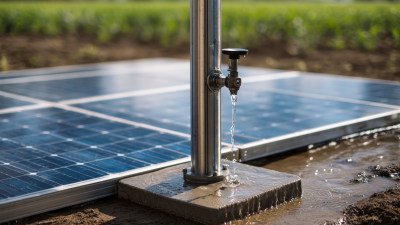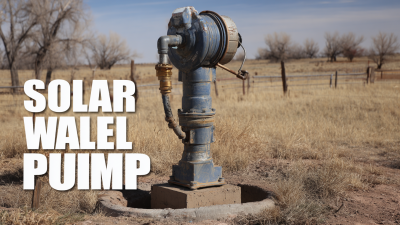Unlocking Efficiency: The Advantages of Solar Panel Water Pumps for Sustainable Water Solutions
In recent years, the push for sustainable solutions has led to a significant rise in the adoption of renewable technologies across various sectors. Among these innovations, the Solar Panel Water Pump has emerged as a leading choice for efficient and eco-friendly water management. According to a report by the International Renewable Energy Agency (IRENA), the use of solar-powered pumping systems can reduce energy costs by up to 80% compared to traditional diesel pumps, making them not just environmentally friendly, but also economically viable. As global water demands continue to increase, implementing Solar Panel Water Pumps can help address water scarcity, particularly in rural areas, while simultaneously contributing to the reduction of greenhouse gas emissions. This blog will delve into the myriad advantages of Solar Panel Water Pumps, offering insights and tips for those looking to enhance their water solutions sustainably.

Benefits of Solar Panel Water Pumps for Eco-Friendly Irrigation Strategies
In the quest for sustainable agriculture, solar panel water pumps have emerged as a game-changer for eco-friendly irrigation strategies. Utilizing renewable solar energy, these pumps provide a reliable and cost-effective solution for farmers who wish to minimize their environmental footprint. Unlike traditional electric pumps, which often rely on non-renewable energy sources, solar pumps harness the sun's power, resulting in zero greenhouse gas emissions and significant reductions in energy costs over time.
Moreover, solar panel water pumps enable efficient water management in regions with limited access to electricity. They can be installed in remote areas, allowing farmers to irrigate their crops without the need for extensive infrastructure. This versatility not only enhances agricultural productivity but also promotes the conservation of water resources. By using only the water necessary for their crops, farmers contribute to sustainable farming practices that are beneficial for both the economy and the ecosystem. As nations strive for greener solutions, solar-powered irrigation is undoubtedly paving the way toward a more sustainable future in agriculture.

How Solar-Powered Pumps Support Rural Communities and Small Farmers
Solar-powered water pumps are transforming the agricultural landscape, particularly in rural communities where access to clean water is essential. According to a report from the International Renewable Energy Agency (IRENA), solar irrigation systems can increase crop yields by up to 30%. This boost in productivity is vital for small farmers who often struggle with unreliable water sources and high energy costs associated with traditional pumps. By harnessing the sun’s energy, these pumps not only reduce operational expenses but also provide a more sustainable solution to water scarcity.

Furthermore, the Global Environment Facility (GEF) estimates that solar water pumping systems can lower greenhouse gas emissions by as much as 90% compared to diesel-based pumps. This significant reduction not only helps in mitigating climate change but also fosters resilience in rural economies reliant on agriculture. As small farmers adopt these technologies, they gain greater autonomy over their water resources, leading to improved livelihoods and community stability. The integration of solar panel water pumps thus represents a critical step toward sustainable water solutions that empower rural populations and enhance food security.
Comparing Solar Water Pumps with Traditional Water Pumping Methods
When comparing solar water pumps with traditional water pumping methods, the disparities in efficiency and operational costs are glaring. According to a report from the International Renewable Energy Agency (IRENA), solar water pumps can reduce water pumping costs by up to 70% compared to diesel-powered systems. This significant reduction is primarily due to the elimination of fuel costs and lower maintenance requirements associated with solar technology.
Moreover, a study published in the Journal of Cleaner Production highlights that solar water pumps have a longer lifespan than conventional pumps, which are often subject to wear and tear from fuel combustion. Solar pumps can operate for over 20 years with minimal upkeep, which not only decreases operational costs but also enhances the sustainability of water management practices. As global water demands rise, especially in agriculture and rural communities, adopting solar pumping solutions presents an effective way to ensure reliable water access while minimizing environmental impact.
The Role of Solar Panel Water Pumps in Climate Resilience and Water Conservation
Solar panel water pumps play a pivotal role in enhancing climate resilience and promoting water conservation, particularly in regions facing water scarcity. According to a report by the International Renewable Energy Agency (IRENA), solar-powered systems can reduce water pumping costs by up to 80%, making them an economically viable option for farmers and communities reliant on irrigation. This significant reduction in operational expenses is crucial for both agricultural productivity and the sustainability of local water sources.
Moreover, utilizing solar panel water pumps contributes to the mitigation of climate change effects. The United Nations Food and Agriculture Organization (FAO) indicates that sustainable water management practices, including solar irrigation, can enhance crop resilience to climate variability. By reducing dependence on fossil fuels, these water pumps minimize greenhouse gas emissions, aligning with global targets to combat climate change. As a result, integrating solar panel water pumps not only ensures a steady water supply but also fosters a more sustainable approach to resource management in an increasingly unpredictable climate.
Unlocking Efficiency: The Advantages of Solar Panel Water Pumps
Investing in Solar Panel Technology: Cost-Effectiveness and Long-Term Gains
Investing in solar panel technology for water pumping systems offers remarkable cost-effectiveness and long-term gains. According to the International Renewable Energy Agency (IRENA), the cost of solar photovoltaic (PV) systems has plummeted by over 80% since 2010, making solar energy not just a sustainable choice but also an economically smart investment. Utilizing solar panel water pumps can drastically reduce electricity costs related to traditional water pumping methods, which often rely on expensive and unreliable fossil fuels.
For instance, a study by the World Bank highlighted that solar water pumps can result in cost savings of up to 50% compared to diesel pumps, especially in remote agricultural areas.
Furthermore, solar panel water pumps deliver significant long-term benefits by minimizing maintenance costs and enhancing system longevity. Research published by the National Renewable Energy Laboratory (NREL) shows that solar pumps typically have a lifespan of 20-25 years, compared to 10-15 years for conventional pumps. This durability translates to lower replacement costs and less frequent maintenance, allowing farmers and communities to allocate resources more efficiently. The transition to solar-powered pumping systems not only fosters sustainable water solutions but also empowers users by providing reliable access to water, particularly in regions facing water scarcity.
Related Posts
-

Top 10 Solar Panel Water Pump Manufacturers from China at the 137th Canton Fair
-

Exploring Versatile Applications of Best Solar Panel Water Pumps and Effective Usage Tips
-

Exploring the Advantages of the Best Solar Water Pump for Irrigation Needs
-

Unlock the Power of Best Solar Powered Water Pumps Understanding Technical Specs and Installation Guide
-

Unlocking Efficiency: The Advantages of Solar Panel Water Pumps for Sustainable Irrigation
-

The Ultimate Guide to Choosing the Best Solar Well Pump for Efficient Water Management
Contact Details
Address:
Solar Pump Solutions,
Borrisokane, Co. Tipperary, Ireland.
